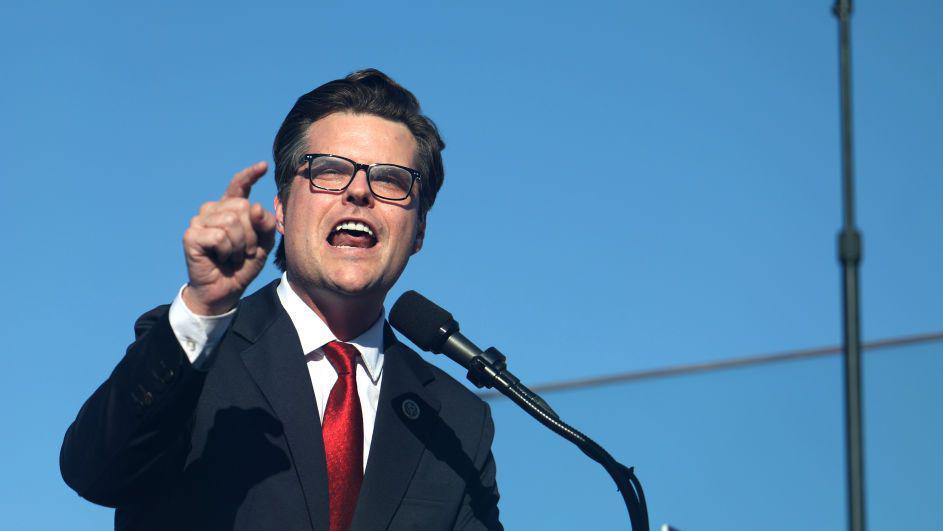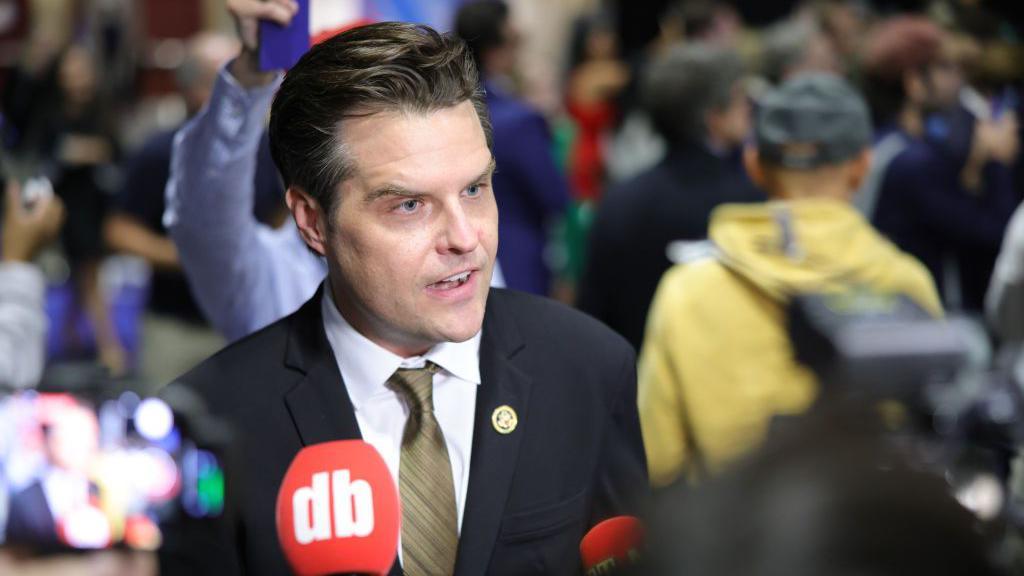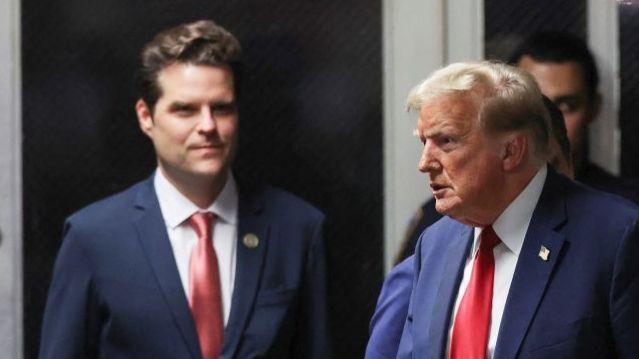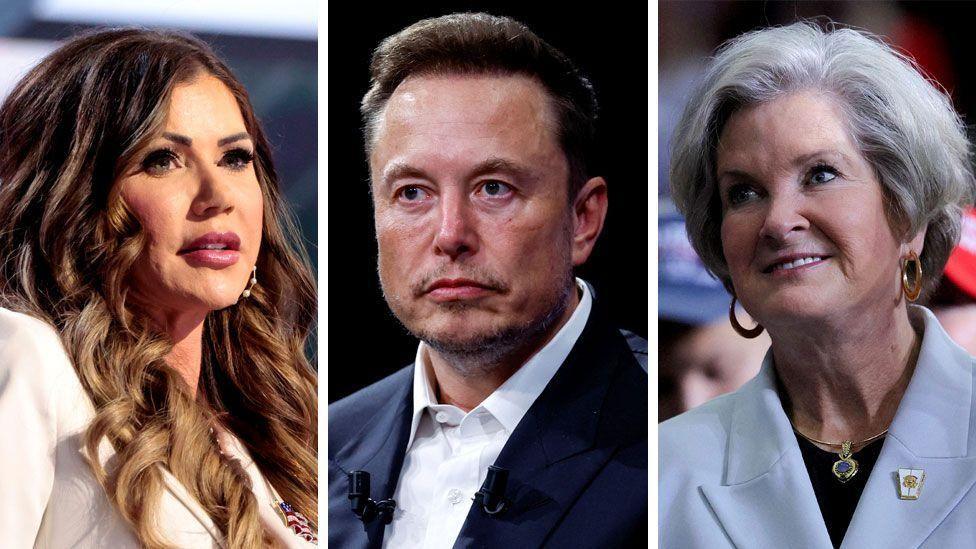Matt Gaetz withdraws as Trump's nominee for attorney general

Matt Gaetz would have been the top US law enforcement officer in the US if he had been confirmed.
- Published
Former Florida Congressman Matt Gaetz has withdrawn his name from consideration to become attorney general after days of debate over whether to release a congressional report on sexual misconduct allegations against him.
On X, formerly Twitter, the 42-year-old said that the controversy over his potential nomination "was unfairly becoming a distraction" to the work of the incoming Trump administration.
The report included the findings of a probe sparked by allegations of sexual misconduct and illicit drug use.
Gaetz has denied the claims but said that he hoped to avoid a "needlessly protracted Washington scuffle."
The withdrawal of Gaetz - who Donald Trump selected to be the top US law enforcement officer - represents a setback for the president-elect.
On his own Truth Social social media platform, the former and soon-to-be president said he appreciated Gaetz’s effort to become attorney general.
“He was doing very well, but at the same time, did not want to be a distraction for the administration, for which he has much respect,” Trump added.
In his post on X, formerly Twitter, Gaetz said that Trump's justice department "must be in place and ready" on the first day of his administration in January.
"I remain fully committed to see that Donald J Trump is the most successful president in history," he wrote.
"I will forever be honoured that President Trump nominated me to lead the Department of Justice and I'm certain he will save America," Gaetz added.
The shadow cast by the long-running investigation by a congressional ethics panel into a number of claims involving drugs, bribes and sex meant that Gaetz was likely to face an uphill battle when it came time to be confirmed by the US Senate.
Lawmakers - including some fellow Senate Republicans - had expressed concern about his nomination, reportedly prompting a significant closed-door effort by him and Trump to secure the necessary support.
The day before his withdrawal, the House Ethics Committee - which compiled the report - met behind closed doors to debate whether or not it should release the report into Gaetz.
The committee's ranking Democrat, Susan Wild, said that the group had not been able to come to an agreement and was evenly divided, 5-5, on party lines.
Its chairman, Michael Guest, told reporters on Thursday that his withdrawal "should end the discussion of whether or not the ethics committee should move forward in his matter."
"He is no longer a member of Congress, and so I think that this settles any involvement that the ethics committee should have in any matters involving Mr Gaetz," he said.
Gaetz resigned from his House seat last week after Trump nominated him to become attorney general.
It is unclear whom Trump will nominate in his place.
The allegations stem, in part, from a woman's claims that she attended a 2017 party with him and witnessed the then-congressman having sex with a minor.
The woman's lawyer later said that the woman, as well as another witness, were paid by Gaetz to have sex with him.
A separate three-year federal sex trafficking investigation into Gaetz ended with no charges brought against him.
Will Matt Gaetz return to Congress?
It is unclear what will come next for Gaetz, who provided no detail on his future plans in his announcement.
President-Elect Trump said only that he has a "wonderful future" and will do "great things".
Experts have suggested that it is unlikely that Gaetz would try to return to the House - where he was re-elected to his seat in the November election - as it would mean that the Ethics Committee report could be made public.
Senior Republicans, including House Speaker Mike Johnson, have used his resignation as justification to avoid publishing the committee's findings.
But he could return to the Capitol in the upper chamber. Florida's Governor, Ron DeSantis, could appoint him to a vacant seat that is likely to be left by Senator Marco Rubio, whom Trump has nominated as his secretary of state.
Gaetz could also lobby for another position in the administration that does not require a Senate confirmation.
Who could replace him as Attorney General nominee?
Moving forward, Trump is likely to pick another attorney general nominee to carry out his agenda at the justice department - which he has described as ending "weaponised government", protecting US borders, dismantling criminal organisations and restoring Americans' "badly-shattered faith and confidence" in the department.
On Monday, some of Trump's congressional allies said they were ready to begin assessing other contenders.
"This provides the president an opportunity to look at other very qualified individuals who can help to revamp the justice department," South Dakota Senator Mike Rounds was quoted as saying by Politico.
"Probably a number of them would be very acceptable to members of the Senate, who really do want to see the president's agenda move forward," he added.
Rounds added that he believes that there was "some information out there that the president was not aware of when he made the original recommendation".
Among the names so far put forward as possibilities are:
Texas Attorney General Ken Paxton
Former Chairperson of the Securities and Exchange Commission Jay Clayton
Missouri Attorney General Andrew Bailey
Utah Senator Mike Lee
Former Office of Management and Budget general counsel Mark Paoletta
Carl Tobias, a law professor at the University of Richmond, told the BBC that "an obvious candidate" would be Todd Blanche, who represented Trump in his New York criminal trial and has already been nominated to serve as deputy attorney general.
Other possibilities include Virginia Attorney General Jason Miyares or senior Republican members of the Senate Judiciary Committee, including Ted Cruz, Tom Cotton or Josh Hawley.
The latter two have suggested that they would prefer to stay in the Senate.
Related topics
- Published22 November 2024

- Published14 November 2024

- Published25 February
